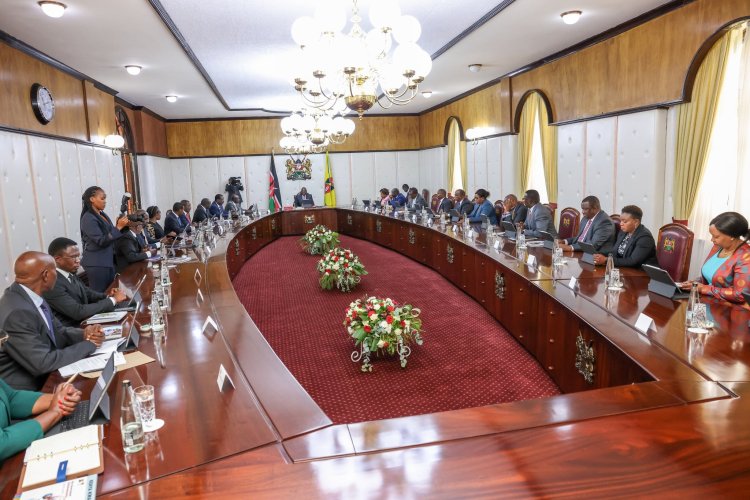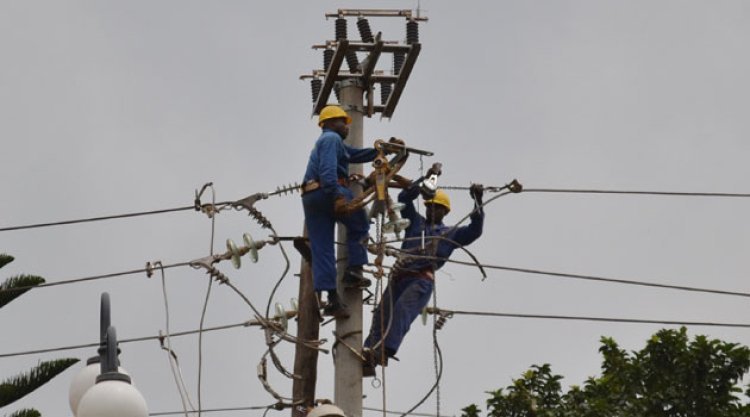Cabinet Orders Unbundling Of Kenya Power Lines In Ksh66 Billion Plan To End Blackouts
Ruto, who chaired the Cabinet meeting on Wednesday, December 13, lamented that the frequent power outages were hurting Kenya’s investment profile.

President William Ruto has directed the Ministry of Energy led by Cabinet Secretary Davis Chirchir to comprehensively deal with the challenge of power blackouts that include the unbundling of Kenya Power transmission lines.
Ruto, who chaired the Cabinet meeting on Wednesday, December 13, lamented that the frequent power outages were hurting Kenya’s investment profile.
The Cabinet discussed the matter extensively and resolved that the transmission line system should be unbundled so that power failure in one part does not affect the entire country.

Blackout at JKIA on December 10, 2023. /X
To deal with the overloading of transmission lines that cause outages, the Bomet-Narok line will be built with €400 million (Ksh66 billion) from the African Development Bank. The line, which was funded in 2016, has not been built due to legal disputes.
Additionally, a €1.2 billion (Ksh200 billion) KenGen solar power project at the Seven Forks Dam will provide a safeguard against power failure.
"The 42MW project has a huge battery storage and when power fails, the stored energy kicks in.
"Additionally, the project helps to save hydro-power at the five dams that make up the Seven Forks," a statement from the Cabinet meeting seen by Viral Tea read in part.
This comes after Chirchir attributed the nationwide blackout on Sunday, December 10 to an overload along the Kisumu- Muhoroni line.
Speaking to the press on Monday, December 11, the CS revealed that the overload was a result of the sudden demand for power supply, which caused the powerlines to drop, triggering the blackout which occurred twice hours apart, bringing to four the total number of power blackouts Kenya has witnessed this year alone.
“As a country, we are ashamed of the power blackout problem that happened yesterday. It was caused by an overload that was witnessed along the Kisumu -Muhuroni line which only carries 80 megawatts. Yesterday the line was carrying 149 Megawatts,” he said.
An overload in an electrical system can potentially cause a power blackout. It occurs when the demand for electrical current in a circuit exceeds its capacity.
This can happen if too many devices are connected to a single circuit or if there is a malfunction in the electrical system.
When an overload occurs, the electrical components, such as wires and transformers, may overheat. In extreme cases, this can lead to damage or failure of the equipment and, in turn, may cause a power outage.
However, nationwide blackouts are often the result of larger and more systemic problems, such as:
-
Major Equipment Failures: Failures in critical components of the power grid, such as large transformers or transmission lines, can have cascading effects and lead to widespread outages.
-
Natural Disasters: Severe weather events, earthquakes, hurricanes, or other natural disasters can damage infrastructure, causing extensive and simultaneous failures across the grid.
-
Cyberattacks: Sophisticated cyberattacks targeting the control systems of power grids can disrupt operations and lead to large-scale outages.
-
Fuel Supply Disruptions: In some cases, power generation relies on specific fuel sources (like natural gas, coal, or nuclear fuel). Disruptions in the supply chain for these fuels can impact power generation and lead to widespread outages.


 admin
admin 




